UNJournal Jon Lee | The Global Impact Coalition (GIC), a CEO-led collaborative platform for a net-zero chemicals future, is proud to announce LG Chem as its newest member.
As one of the world’s largest chemical companies and a leader in sustainable materials, LG Chem’s membership sends a strong signal to Asia and the broader industry that global collaboration is essential to developing sustainable and commercially viable solutions.

This milestone reinforces GIC’s growing global impact and highlights the importance of international partnerships in scaling up solutions to reduce emissions. Notably, LG Chem is the first Korean company to join GIC, further cementing its commitment to fostering global collaboration for climate action.
Through its membership in the GIC, LG Chem will collaborate with global industry leaders to scale sustainable technologies and explore new circular business models. LG Chem will work with other industry leaders on topics including sustainable methanol, improving end-of-life plastics recycling and utilizing AI to guide value creation along the chemicals value chain.
Hak Cheol Shin, Vice Chairman and CEO of LG Chem, stated: "Joining the Global Impact Coalition reflects LG Chem’s dedication to leading the way in sustainability. The GIC provides a unique opportunity to collaborate with peers and co-create solutions to accelerate the transition to a circular, net-zero future. We’re eager to bring our expertise in sustainable materials to the GIC and contribute meaningfully to the GIC’s mission."
Charlie Tan, CEO of the Global Impact Coalition, welcomed LG Chem to the platform: “We are honored to have LG Chem join the Global Impact Coalition. Their presence strengthens GIC’s global reach, particularly in East Asia, a region central to the chemical sector’s future. Together, we can fast-track the chemical sector’s transition to a circular and low-carbon economy.”




